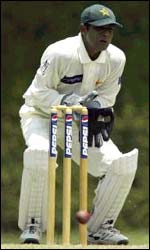PCB treats the symptoms
Daniel Laidlaw
The officials of the Pakistan Cricket Board have lately outdone themselves.
With its team an object of pity and derision following a humiliating 3-0
loss to Australia and the need for a cool-headed review of the disaster
paramount, the PCB did what any self-respecting board in its position would
have done: announce the formulation of a fines and incentives scheme
rewarding players for individual accomplishments and penalising them for
losses and lack of fitness.
In an October 28 press statement, the PCB announced the inclusion of what it
termed a "Performance Based Emolument" clause in its existing tour
contracts. This clause will see players, from the current Zimbabwe tour
onwards, paid an extra 20 per cent in addition to their regular fees for each win,
fined 20 per cent for each loss, fined up to $1000 by the physio/trainer for being
unfit and paid an extra 20 per cent for individual accomplishments within the match.
It sounds so straightforward, so seductively simple, that it's easy to see
why it might appeal to results-focussed Board members. Threaten players with
fines, and they'll be compelled to try their hardest every game. Reward them
individually, and they'll each strive to do better. Right? Err...
The intention is surely admirable, but for a team often reported to be
wracked by divisiveness, the PCB has introduced the one measure almost
guaranteed to be counter-productive to team harmony and cultivating a
winning spirit. Balancing the demand for accountability and effort must be
the provision of the stability and job security necessary for players to
perform at their peak. Superficially, the threat of being dropped from match
to match may appear to be a motivating factor, but it's been fairly well
documented how in reality this only leads to anxiety, selfishness and
ultimately worse performances.
The threat of being fined, while not as immediate a concern as losing one's
position, is not dissimilar. No matter how good the team or intense the
effort, losses will still sometimes happen. While players are threatened
with losing money because of this, they will not always have the necessary
focus, and at some point must become resentful.
True, this is balanced by similar reward for wins, but these are still
really secondary considerations, and ignore the larger premise implicit in
the decision, which is that players are only motivated to give their best
for their country by money or the threat of having it taken away. That is
what is truly galling about the PCB's decision.
If it is indeed true that some players require the threat of financial
penalty to produce their best, or can only be enticed to score a hundred,
hold a catch or take five wickets by a few more rupees tacked onto their
match fees, then surely these are not the type of players who should be
selected in the first place. What does it say about the players, or at least
the administration's opinion of them, that they need these inducements to
give their best? Honestly, whether the World Cup is worth $500 or $5 million
in prize money, would not the motivation to win it be all the same? Forget
even the amateurish joy of competing, what happened to the glory of winning?
Again, if that is what is required to get players to perform, then the
system and values which have produced that state of mind are in desperate
need of an overhaul. The cause of the malaise needs treatment, not the
symptoms once they have reached that parlous stage.
 Unfortunately, captain Waqar Younis publicly welcomed the decision. "I think
it will bear positive results and be a great motivation for the players to
thwart a defeat and always go for the win," Waqar told AFP (if you're not
always going for the win anyway, then what exactly are you doing?)
Unfortunately, captain Waqar Younis publicly welcomed the decision. "I think
it will bear positive results and be a great motivation for the players to
thwart a defeat and always go for the win," Waqar told AFP (if you're not
always going for the win anyway, then what exactly are you doing?)
"I do not see it as a threat and hope that players will do their best to
cash in on these incentives," Waqar continued. "Pakistani cricket will
improve only with the mutual consent of players and the board and I see full
cooperation between them."
Waqar's sentiments were disappointing because, if the players thought about
it a little, they should have found the decision slanderous. It suggests
they value cash over performance and results, which the PCB should realise
is tantamount to admitting they have a mentality which would allow them to
consider match-fixing. If they won't offer their best effort unless rewarded
or threatened, then it is not inconceivable they could also be persuaded to
perform below their best for the same reasons, which remains an
uncomfortable reality. If this is his idea of "getting tough" with players,
then General Tauqir Zia should have resigned after all.
In a team environment, individual performance-based incentives - or
disincentives, as the case may be - are fraught with danger anyway. We see
it in American sports such as the NFL, where wide receivers have been known
to demand the ball to improve their statistics and thus reach certain
performance clauses in their contracts, irrespective of what benefits the
team. Suffice to say, this is contrary to the ideals of cricket, and the
idea of bonuses based on statistical figures leaves one a little uneasy.
Effort is not really quantifiable. Without team spirit and desire to win,
success surely can't last, or at least one would like to think not. This is
an ill-advised move by the PCB, and does not solve the cause of the
perceived problem.
The day before this inspired motivational development was announced, the PCB
issued a press statement announcing the resignation of former coach Mudassar
Nazar from his recently reacquired position as head of the National Cricket
Academy. Nazar, you will remember, lost his job as Pakistan coach during the
Champions Trophy on September 17.
In an interview with Faisal Sharif, published October 16, PCB chairman
General Tauqir Zia stated: "I have not sacked Mudassar Nazar. He will take
care of the National Academy back home. Nazar was my National Academy
organiser. He also runs his businesses in Dubai and Pakistan. One man cannot
do three jobs. So he had to go." I guess one man cannot do two jobs, either,
as on October 27 Mudassar stepped down from that post, citing business
commitments, with the PCB thanking him for his "commitment and sincerity to
set up the academy."
Instead of this transparently face-saving sacking, Pakistan cricket would
have been better served had Chairman Zia actually heeded Mudassar's advice
instead. In the September 17 press statement, detailing the discussion between
Zia and Nazar after the latter had been called home during Pakistan's
Campions Trophy campaign, Nazar cited burn-out due to excess cricket as his
main concern. "He opined that if the players were to be considered for the
World Cup, they should be rested and given proper training at home", the
statement stated. The reports of the manager, doctor and trainer reportedly
expressed similar views.
Evidently, this was not the answer the cash-strapped PCB needed to hear. In
addition to Mudassar failing to retain his job, it was obviously decided
that rather than suffering from burn-out, players were in fact not motivated
enough to keep themselves fit.
Rashid Latif has become the first case in point. Forced out of the Zimbabwe
tour with what was described as a "career-threatening neck injury", Latif is
returning home to be rehabilitated - and quite possibly fined.
 Latif, a player of integrity who sacrificed his place in the team for around
three years in protest over match-fixing, is now subject to a report on
whether he lied about his fitness before touring. Can you imagine if Steve
Waugh, after tearing his calf against England in the third Test last year
and proceeding with determination to be fit for the fifth, was told by the
trainer that he may be fined, pending a report into whether he carried the
injury into the match or not? It's preposterous, and can only serve to
further the mistrust which must exist between the Board and the players.
Latif, a player of integrity who sacrificed his place in the team for around
three years in protest over match-fixing, is now subject to a report on
whether he lied about his fitness before touring. Can you imagine if Steve
Waugh, after tearing his calf against England in the third Test last year
and proceeding with determination to be fit for the fifth, was told by the
trainer that he may be fined, pending a report into whether he carried the
injury into the match or not? It's preposterous, and can only serve to
further the mistrust which must exist between the Board and the players.
Current manager Brigadier KM Nasir told Reuters: "We are doing our utmost to
ensure he (Latif) is fit for the World Cup next year." But while Rashid
returns home for rehabilitation in an attempt to be ready to lead Pakistan's
World Cup campaign, the PCB will seek a report from physio/trainer Dennis
Waight to determine whether Latif was injured prior to the Zimbabwe tour.
What this means, presumably, is whether Waight thinks Latif, veteran of 34
Tests and 140 ODIs, lied about his condition before touring in order to
retain his position and collect his tour fee. How Waqar Younis could have
welcomed this system defies good sense.
All injured players are apparently to be held in a state of suspicion. That
being the case, it is incumbent upon the PCB to resolve why they feel this
is necessary, rather than reacting with petty fines. If there is a suspicion
Pakistan's players are not motivated to represent their country to the best
of their ability, that it takes money to get them to perform and that they
would lie about their fitness to tour, then the PCB should consider why.
The players do not have a long-term contract system or a representative
body. Why? If the players had the security of knowing they would not lose
their income when injured, might they not feel compelled to lie about their
health? With future secured, might not the focus of winning matches, rather
than incentives from whatever source, return to being the primary focus? If
players are indeed complacent about their positions, wouldn't it make sense
to have a more transparent system of selection and demotion, clearly
articulating to the players what is expected of them, so that they are both
aware their selection for the next game or series is not arbitrary and know
that if they don't perform there is a replacement ready to take their spot?
It could be done. But if the fines system fails, as it inevitably will, it
will be much easier to simply sack coach Richard Pybus, for the fourth time.
I hear Mudassar Nazar is available.
More Columns
Mail Daniel Laidlaw